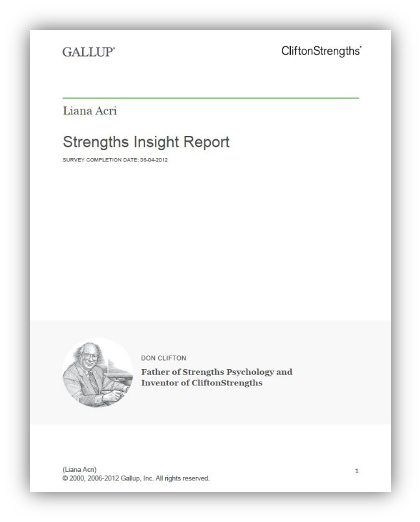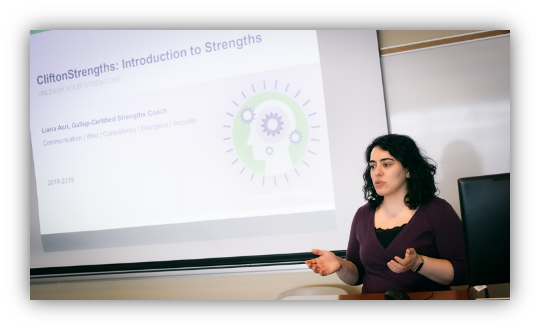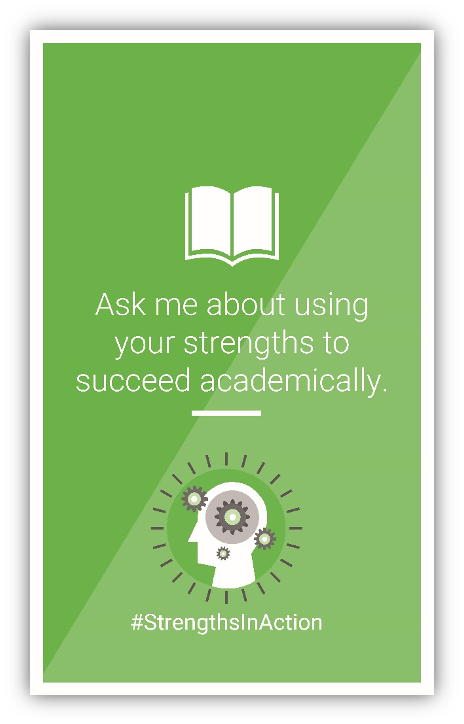By: Liana Acri
It was early in 2017 when our Student Life department received the approval we had been waiting for – we were embarking on a journey to make the University of Guelph-Humber a CliftonStrengths campus and I was tasked with leading the project. I was both excited to lead a project I was passionate about and nervous about how it would all come together. This project was particularly important to me because of the impact CliftonStrengths had made in my life and how the tool was being used to support post-secondary students’ development.
In 2012, I signed up for a professional development workshop and discovered my Top 5 CliftonStrengths are Communication, Woo, Consistency, Discipline, and Includer. At first these were mostly made up words with definitions that were new to me but as a I learned more, I understood how useful this tool could be. Discovering my CliftonStrengths improved the way I saw myself, elevated my study habits, enhanced the way I approached my work, and gave me a common language to use when advising students. Out of all the “personality assessments” I have taken, CliftonStrengths resonates with me most because of the personalized results and their seemingly infinite combinations – the odds that someone will have the exact same Top 5 results in the exact same order is 1 in 33 million (Leibbrandt, 2013).
What is CliftonStrengths?
You may be asking what is CliftonStrengths (CS) and how does it help students? Donald Clifton’s decades of research rooted in positive psychology led to the creation of the CS assessment. When people complete the assessment, they receive a report describing their Top 5 talents (out of 34) with tips for investing in them in order to develop them into strengths.
“CliftonStrengths provided me with the resources necessary to reflect on what I am naturally talented at and put those reflections into actions in ways I never imagined possible. This program gave me confidence in my unique set of strengths and gave me actionable guidance about how I can incorporate these “superpowers” into my academic, professional, and personal lives.”
– Vic Duarte, Justice Studies student

To learn more about the history of CS and how it’s being used by others in Student Affairs, I recommend reading this blog post: Strengths-Based Teaching: The Role of CliftonStrengths for Postsecondary Students in Teaching Roles.
CliftonStrengths at the University of Guelph-Humber
For those unfamiliar with the University of Guelph-Humber (UofGH), we are located in Toronto, Ontario, Canada and are a joint venture between two Ontario post-secondary institutions – the University of Guelph (U of G) and Humber College Institute of Technology and Advanced Learning (Humber). Our students graduate with both a U of G honours degree and Humber diploma in only four years. We currently offer seven focused programs at the undergraduate level and have an enrollment of 4,818 (University of Guelph-Humber, 2020).
When we started our CS program at UofGH in 2017, our target audience was first-year students and student leaders. The goal was every student would receive an access code by the 2020-21 academic year. Over the past few years, we have developed a program that is woven into our curricular and co-curricular programming. Here are some of our successes, challenges, and the lessons learned along the way.
Successes
Champions: I cannot say enough about the value of people who believed in what we were doing and acted as an ambassador for our CS program. Whether it was senior administrators adding their Top 5 strengths in their email signature, staff asking about a student’s strengths during an advising session, faculty who invited me to present in their classes, or student leaders who shared their story of how their strengths helped them succeed, they all contributed to building awareness and elevating the value of our CS program.
“CliftonStrengths has provided valuable language and perspective to use when engaging with students and staff in various interactions, including training, check-ins, and delegation of tasks. With student staff, I’ve shifted the focus of my annual check-ins to include discussion of their top 5 strengths and encourage students to reflect on how their strengths contribute to their performance in their role and any identified areas of improvement.”
– Jessica Pilfold, Student Life Coordinator
Weaving: My approach for launching this program was to connect it to existing structures by weaving it into our Orientation program, training for student leaders, and our curriculum. All new students participated in an Introduction to Strengths Workshop during their Orientation program. Afterwards, they were invited to participate in three additional workshops – Groups & Teams, Strengths-Based Resiliency, and Leading with Strengths. For further incentive, each workshop could be added to their Co-Curricular Record (CCR); a formal record recognizing skill development beyond the curriculum. I also worked with faculty to build custom workshops for their courses. One of our longest standing collaborations is in a third-year Kinesiology course, where I co-present workshops with a Career Services Coordinator demonstrating how students can apply their strengths to a job in their field. Then the students are required to further reflect on their strengths for a career map assignment.

“My job at the University allows me to work with students in career exploration from the very beginning of ‘what is a career?’ My CliftonStrengths (Developer, Communication, Maximizer, Arranger, Positivity) have greatly assisted me in finding my ideal career calling by utilizing my talents to assist students in exploring their career aspirations, using positive, organized and optimistic views. Students regularly comment on feeling relieved, more informed and having a better idea on where to begin their career journey.”
– Sandra Fazio, Career Services Coordinator for Justice, Psychology, & Kinesiology
Challenges
Training: Gallup, the company who administers the CS assessment, provides training for using the tool. I was part of a team of four UofGH staff who attended a week-long training. The training gave us in-depth insight and prepared us to be coaches, however it did not provide guidance for launching a CS program at a post-secondary institution. This led me to create a UofGH interdepartmental committee to develop a program to meet the needs of our students. I also leveraged my network of Student Affairs Professionals across Canada and the United States to learn best practices from their CS programs.
Branding: After the first year of the program, we surveyed students who did not complete the CS assessment to determine why. The results indicated a gap in awareness and understanding of the value of the tool. This led to a greater focus on promotions: creating a logo, using the tagline: Unleash Your Strengths, creating customized posters for key campus partners, and hiring a CliftonStrengths Program Ambassador (CSPA) to assist with promotions and manage a volunteer team. The CSPA and volunteers played a key role in peer-to-peer interactions. All these branding efforts led to greater awareness of our CS program amongst students.

Moving Forward
After three years and four intakes of UofGH students, I am pleased to report the program continues to grow and support our students in their journey to reach their academic, personal, and professional goals. For the 2020-21 academic year, my focus is two-fold; to build upon our existing curriculum integration and to explore a peer coaching model. Given the pandemic, I am also working to convert all in-person workshops to a virtual format. Furthermore, I am focusing on adding more content to our website to share the resources the CSPA and volunteer team would normally distribute when promoting the program on campus. The current circumstances presented an opportunity to rework and improve our workshops and resources for students. Now more than ever, Dweck’s (2006) message of a growth mindset is key to instill in our students.
“CliftonStrengths is an incredible test, it opened my eyes to who I am as a person. It highlighted and presented insights on 5 strengths that I truly never considered. After having a coaching call with Liana Acri, she and I were able to narrow professions that would best suit my strengths and ways I can improve my overall life academically and personally with the traits the test presented.”
– Nishanth Puvanendran, Business student
Are you using CS for yourself or with your students? Let’s connect! I’m always happy to chat about strengths, sharing resources, facilitating workshops, having coaching conversations, our CS program at UofGH, etc. Reach out on LinkedIn or email me at strengths@guelphhumber.ca. What other tools and programs do you use to support students? I would love to learn about them.
Liana Acri (she/her), M.Ed., B.B.A, is a Student Life Coordinator at the University of Guelph-Humber in Toronto, Ontario, Canada. She is a Gallup-Certified Strengths Coach and her Top 5 strengths are Communication, Woo, Consistency, Discipline, and Includer.
References
Dweck, C. S. (2006). Mindset: The new psychology of success. Random House.
Leibbrandt, M. (2013, August 28). Strengths: why you are even more special than 1 in a million. Gallup. https://www.gallup.com/cliftonstrengths/en/251552/strengths-why-even-more-special-million.aspx
University of Guelph-Humber. (2020, July 28). 2020-2021 Guelph-Humber Calendar. University of Guelph. https://www.uoguelph.ca/registrar/calendars/guelphhumber/current/pdffiles/calendar.pdf
If you find the bi-monthly posts on the Supporting Student Success website helpful, we invite you to follow the blog by clicking on the “follow” icon above.
